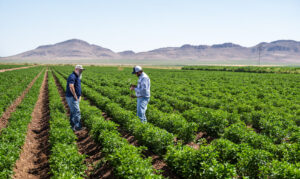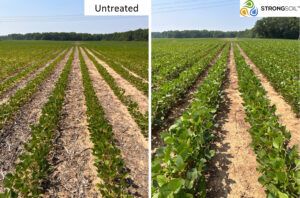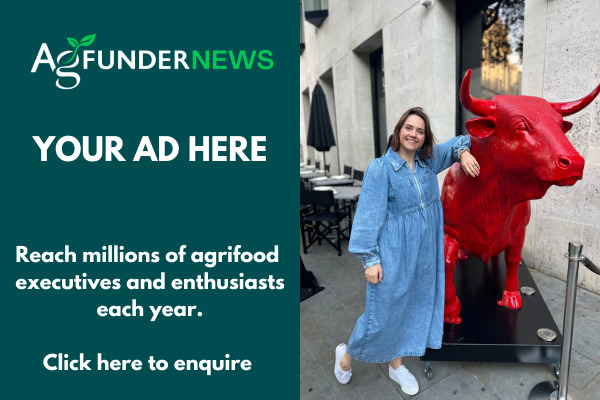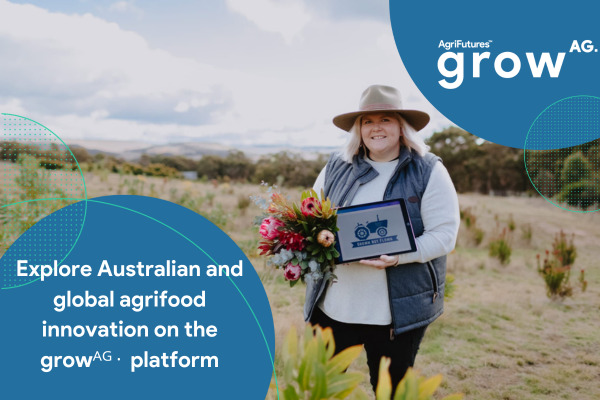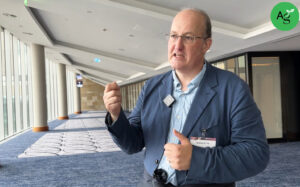The regenerative agriculture movement has changed a lot since I first heard the phrase in 2014.
I’m pretty sure Paul McMahon, managing partner of fund manager SLM Partners, was the first person to educate me about the practice of farming to not just sustain the land but to improve it. He probably sent me regen ag pioneer Allan Savory’s famous TED talk, which sent me trotting along to the Savory Institute’s annual conference in London just over 10 years ago today. There were about 100 people in the room.
Often dubbed the pioneer of regen ag, Savory’s institute educates farmers about his methodology called holistic planned grazing of livestock, or mob grazing, which involves densely populating livestock on smaller plots of land than usual and moving them frequently to mimic how wild herds might move and spread their fertility — read: poo. Savory promised to reverse desertification globally.
Mob grazing is not the only way to do regenerative agriculture — although livestock’s fertility-spreading talents are generally considered important — and Savory and his methods have had their fair share of critique. And there are other important trailblazers in the movement including Gabe Brown, Joel Salatin, Vandana Shiva, Ernst Götsch and John Kempf who have their own approaches.
In fact, the definition of regen ag is quite loose but ultimately means working with nature, not against it. So damaging practices such as tilling or ploughing land, leaving soil bare and uncovered for a significant portion of the year, and using chemical, life-killing inputs are to be avoided. Biodiversity is key.
Small circles, big potential
I was captivated by the potential but the movement was little known beyond small circles, and in the business and investment world I lived in, barely at all. Except for a few trailblazing investment managers.
Paul was one of them, alongside a few others, including Charles de Liedekerke from Soil Capital and Craig Wichner from Farmland LP, who were also raising funds to invest in degraded or low-yielding farmland and transition it to regenerative practices. The hope was to increase income from reduced input costs and higher yields — after a likely steep J curve — and even possibly premium offtake prices, and then sell the improved land at a higher value.
Raising funds based mostly on anecdotal evidence was tough. But Paul and the others managed to get some forward-thinking institutional investors on board for the long 10-year trial of this strategy.
When I joined AgFunder in 2015 to build out AgFunderNews (AFN), which was more focused on agtech than agriculture investment broadly, any articles I wrote about regen ag bombed — even those that tried to fit regen ag into the agtech paradigm. (Nice try Paul!) Back in 2015, AFN readers were far more excited about drones. Agtech investment took off that year.
Regen ag gone viral
Fast forward to around 2019, and it was a different story. AFN articles about regenerative agriculture started to go viral — the word was out in the tech and investing world.
Regenerative agriculture’s climate story was resonating with large businesses, particularly for its carbon sequestration potential — better soil health means more soil carbon (or is it the other way around?!) Corporate net zero pledges were made, carbon markets accelerated, startups pivoted, investors followed, funds were created.
And for farming communities, regenerative agriculture’s potential to detach farmers from the treadmill of high input costs and low margins was increasingly appealing.
Often the seemingly different worlds — big business, tech, investment and farming — do not meet in the middle, and at times the movement itself feels fractured and fraught with debate around the true definition of regen ag, its scalability, the appropriation of an indigenous form of farming by capitalist corporations, and calls for de-growth.
I wrote about this a little last year and heard a lot about it on my podcast New Food Order, and the debate continues today.
Getting personal at Groundswell 2024
But last week at Groundswell, the UK-based regenerative agriculture festival hosted by the Cherry family, the movement felt unified, positive – and big!
There were some 8,000 attendees — apparently double the year before — still mostly farmers but with tech startups, VCs, politicians, princes (!), food brands, and more all rubbing shoulders too.
Sure, many of the large food and supermarket corporations still got stick for paying farmers too little and trapping them in never-ending low margins, and there were passionate questions from the audience to financial sector speakers about their role in deforestation. It’s always important to call out greenwashing.
But the conversations were generally very business-oriented and pragmatic, as well as being highly personal and diverse.
“Profit, profit, profit” bellowed farmer and podcast host Ben Taylor-Davies — known as ‘Regen Ben’ — beer in hand, in the festival’s local pub-style tent during a somewhat cathartic ask anyone anything type session; he was listing his most important considerations when making decisions on the farm.

“This has nothing to do with being noble to wildlife; it just happens that what I learned [about] farming with nature is far more profitable than fighting her at every juncture,” he said.
In the same session, Ben spoke with attendees he plucked from the audience about how regenerative agriculture had brought many of them from the brink of suicide, himself included. The freedom farmers feel at being able to “wrestle back control from the agronomist, the vet agent” and the input suppliers, to “become a problem solver again” are playing a major role in that mental improvement, Ben and his guests argued.
A beginning farmer described his journey into starting a regenerative farm as “have a small life breakdown, liquidate all assets, buy a piece of land and keep ploughing on.” The candor was incredibly refreshing — and entertaining.
“Many agriculture conferences feel depressing, with a constant emphasis on problems and things that are not going well, but not so at Groundswell, which had an atmosphere of hope, joy, inspiration, and enthusiasm,” John Kempf, the founder of Advancing Eco Agriculture, a leading crop health consultant, and designer of innovative soil and plant management systems, told me. (Check out John’s contributions to AFN here.)
From purity to compromise and consumerism
It was business as usual for many, with conversations still centered on how to fund regenerative agriculture, the role of the consumer, measuring and understanding the nutritional profile of regeneratively grown foods, the role of government policy — especially pronounced given the UK’s election today — the role of technology, and the urgency around growing the movement.
The nutritional benefits of regenerative-grown food were much touted across sessions, although the science and measurement tools to prove it are still limited. But the presence of TikTok star Eddie Abbew — known for his diatribes against ultra-processed foods — brought a lot of excitement and hinted at the movement of regen ag into mainstream consumer consciousness.
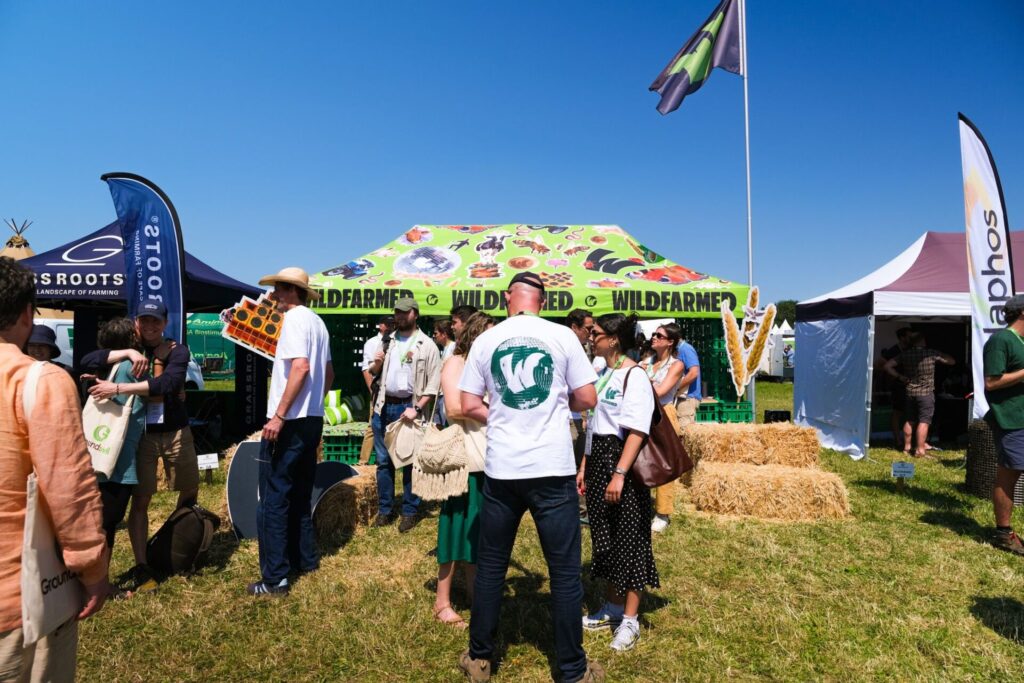
Wildfarmed, the regen ag bread and flour brand now sold in Waitrose and founded by famous UK DJ Andy Cato of Groove Armada, had an awesome, brightly colored stand adorned with its pop art-like branding, another nod to the growing consumer interest in the movement. [Disclosure: I’m an investor in Wildfarmed.]
A panel entitled “Regen on the High Street” featured some of the UK’s largest restaurant chains, one of which is already using Wildfarmed flour for its pizza, but with just 1% of its sourcing from regenerative sources, it’s still a drop in the bucket.
But there were also less common regen topics, such as a keynote talk about gene editing. While I unfortunately missed it, did it perhaps hint at a softening in the movement’s general stance against anything “unnatural“?
And it was refreshing to hear elsewhere from FAIRR Institute, a non-profit that’s generally taken an anti-animal farming stance, albeit a measured one focused on intensive production systems and backed by significant research.
A key theme throughout the event was the need for farmers to make their own path to what works for them; no two farms are the same — from soil type to climate to economics and more. And compromises must sometimes be made. Benedikt Bösel, a regen farmer from Germany, spoke about how he cannot afford to stop ploughing some of his fields and lose yields to the inevitable weeds.
But you could tell that the increasing size and diversity of the event was the key takeaway for most attendees. Much needed, there is still, however, some way to go.
“Our philosophy of regenerative land use systems is certainly growing, and within the framework of the UK, you can see how much people from all sides of businesses and institutions and governments can be involved in it,” said Bösel. “Yet the hype is beyond Groundswell because the reality of most farmers is still very different. They worry about bureaucracy, not being able to plan, and about young people taking over the farm. And I think the key is that we bring those groups together, stop talking about definitions, and start applying those principles to overcome those challenges. So it’s about building bridges to bring as many people as we can from government to society, as well as farmers.”
Did you attend Groundswell? What were your key takeaways? Email me: [email protected]. And keep an eye out for more coverage of the event and topics covered, including nutrition, funding and policy.
More Groundswell takeaways from attendees
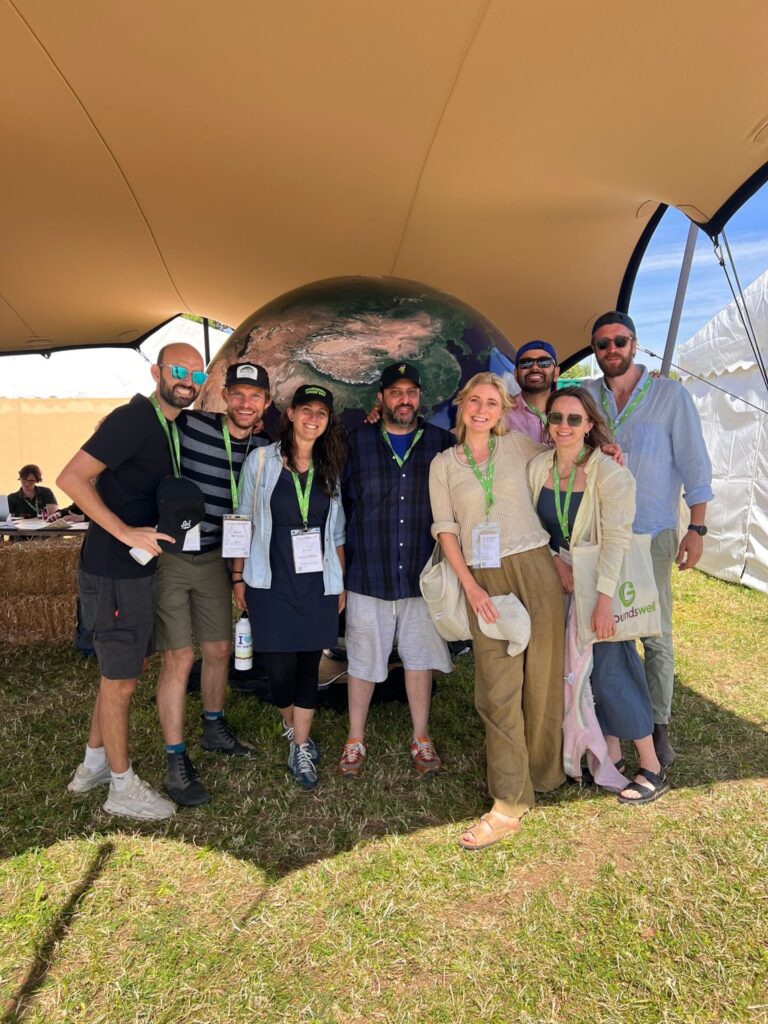
- Saumeel Pachigar, partner at The First Thirty, a venture capital fund investing in early-stage tech companies unlocking the value of nature, said: “This was my first Groundswell and I didn’t know what to expect; I was definitely blown away by the energy and the stories from the entrepreneurs and the farmers. You can really feel like we are early in this but that it’s inevitable and it’s only gonna go in one direction. But it’s clear we need more money coming into this space; we need more entrepreneurs with a bit between their teeth, building and innovating.”
- Koen Van Seijen, host of the Investing in Regenerative Agriculture and Food podcast, said that the 2024 event was more international than ever. He also said: “The bubble is growing and John Kempf made a great point yesterday that there’s a second group beyond the pioneers: young growers and farmers. How do we accommodate the people who are not natural innovators, who don’t like to test everything every day, and are not like inventors constantly, but do need a bit more hand holding, a bit more recipes, a bit more security in this transition?”
- “Attending Groundswell is a great opportunity to hear directly from the arable and cattle farmers implementing sustainable and regenerative practices needed to create sustainable and resilient agricultural supply chains,” said Max Boucher, Senior R&E Manager, Biodiversity and Oceans, at the FAIRR Initiative, a non-profit focused on raising awareness of the ESG risk of intensive livestock farming. “Despite large corporations being part of the discussions, farmers generally report feeling unsupported financially. This reflects FAIRR’s finding in 2023 that just 42% of the companies that see opportunities in regenerative agriculture articulate a want for farmers in their value chains to benefit economically. Henry Dimbleby, the author of the UK’s food strategy, brought a systemic lens to these farm-level initiative discussions, highlighting that the overall share of UK farmland dedicated to grazing and livestock feed production needs to decrease over time for the country to meet climate and nature goals.”
- Addy Windsor-Clive, investor relations manager at Regenerate Asset Management, said: “Groundswell was set up on the basis of knowledge sharing for farmers interested in regen ag. Now its content is hitting a wider audience and informing and educating not only farmers but brands, investors, technologies, projects, corporates and most importantly sceptics. Highlights were updates on how technologies have progressed since last year, seeing the results from trials and experimental farming practices and most of all hanging out with the regen ag community….and above all my mind is still blown about the arrival of the bees. A certain mindset is needed for this transitional phase of agriculture and it was great to be surrounded by innovators catalysing Regen Ag as a sector.”
- “What is exciting about it is it’s not just the climate thing, it’s all of the connections,” said Naeem Lakhani, partner of The First Thirty. “From improving the planet from a climate perspective, but also human health, improving the ground we live on, the food that we eat, the nutrition that makes it into our mouths; it’s all of those things; regen is actually maybe a catch-all for just being better with the planet.”
- “I am really impressed at the scale of the event and I do travel the world to a decent degree in the circuit of the regenerative community and I don’t know of any larger events and more grounded events anywhere on the planet,” Dan Kittredge, executive director of the Bionutrient Association, told AFN on the sidelines of the event. “So I’m very proud of the Cherries [the organizers] for their work. It’s really exciting.”


